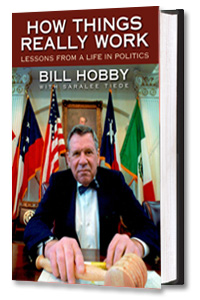Governor Pick Perry doesn’t like the way higher education is funded. He wants to micromanage it.
He doesn’t care that higher education is poorly funded. (Texas ranks 50th in percentage of high school graduates, 27th in college graduates.) The issue is neither higher education nor funding, issues about which he knows little and cares less.
The issue is the power of the Governor vs. the power of Legislature. The Texas Constitution gives the Governor the power of line item veto. The Governor can veto certain “items of appropriation” without vetoing the whole appropriations act. The line-item veto is almost meaningless because the Legislature can package items to keep a Governor from micromanaging.
Knowing that his plan will be unpopular, Governor Perry recently summoned the presidents of Texas public universities to his office and told them they would be in trouble if they criticized it.
The Governor wants to be able to veto “special items”. Special items are frequently research and public service projects undertaken by the universities that reflect the special needs of the community the university serves. These items are “special” because they are not funded by the formulas that generate the money for teaching and apply only to a specific university.
At the University of Houston, for example, space exploration in conjunction with NASA and superconductivity to increase the efficiency of power transmission are special items. So is the Center for Public Policy which does research on government issues, frequently with the support of the National Science Foundation or the City of Houston.
Special items are covered by a provision in the Education Code that appropriates money for higher education in a lump sum. In other words, the Governor would have to veto an entire university, not just a particular item.
Ninety years ago Governor James Ferguson did just that and was impeached because he did so. He vetoed the University of Texas appropriation because the university Regents wouldn’t fire the president who wouldn’t fire professors the Governor didn’t like. Ferguson summoned Regent George Washington Littlefield and told him he would not veto the appropriation if President Robert E. Vinson resigned. President Vinson asked Littlefield how he should respond. Littlefield said “I would tell him to go to hell!”
Vinson said that the expression was “somewhat out of line with my own customary forms of expression” but asked Littlefield “to convey the substance of his statement to the Governor as my reply, leaving the
exact verbiage to (Littlefield’s) own discretion”.
President Vinson also got divine guidance. Texas Episcopal Bishop George Herbert Kinsolving was closely associated with the University of Texas. As Vinson later told the story: “Just at that moment the ringing of the telephone interrupted the proceedings and the voice of Bishop Kinsolving came to my ears. ‘No matter how I know it, but I know what is going on,’ he said, ‘but don’t you resign.’ That message had much to do with the decision then made.”
Ferguson vetoed the appropriation that same afternoon and the University of Texas was in the ditch. But then a remarkable thing happened, probably unique in the history of public education. Two of the Regents pledged their fortunes by personally guaranteeing the university’s budget of $1,627,404. Littlefield and George Washington Brackenridge were long-time Regents who disliked each other intensely. They had served on opposite sides in the Civil War. They disagreed, often bitterly and personally, about almost everything except the welfare of the University. Both had given enormous amounts of money to the University. Various structures on the UT campus are named for them. Brackenridge also gave the city of San Antonio the park that bears his name.
The House then impeached Ferguson and the Senate removed him from office. (Accidentally or intentionally, Ferguson didn’t veto a particular assistant math professor. That’s micromanaging!)
Technically, Ferguson wasn’t impeached because of the veto, but the veto was the proximate cause. There were plenty of other grounds for impeachment. Ferguson had been indicted for misusing public funds. He was selling pardons. But it was the University of Texas veto that really got him in trouble.
The Legislature reappropriated the money. My father, who had succeeded Ferguson as Governor, signed the bill and all was well. My father beat Ferguson in the next election by a large majority.
The University was out of the ditch and the Regents were off the hook.
Ninety years later, Governor Perry is pretty confused about the powers of the Governor and the powers of the Legislature. In power struggles between the Governor and the Legislature, the Legislature wins.
Maybe the Governor should just issue another illegal executive order.
(Bill Hobby was a Regent of the University of Houston (1965-69), Lieutenant Governor of Texas (1973-91), and Chancellor of the University of Houston System (1995-97). He taught at the LBJ School of Public Affairs at UT-Austin (1990-95) and now teaches political science at Rice University. He can be reached at [email protected].

